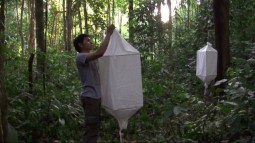Biosemiotic Borneo and Other Forests
screening and talk
From a phenomenological perspective, signification is an individual, language-based process that takes place in our brains. For their project filmed on Borneo, Nabil Ahmed and Ursula Biemann draw on biosemiotics, which extends the semiotic premises to all living being; it is based in the idea that life is semiotic in nature.
Taking signification outside the linguistic domain has immediate consequences for where and how we understand reality to manifest, which is a major concern in artistic practice.
The artist-authors expand on their new project Biosemiotic Borneo as well as other forest related art and research projects that they pursue individually. Ursula Biemann will raise cosmopolitical questions in connection with Forest Law on the Rights of Nature in the Ecuadorian Amazon. Drawing from his ongoing research on environment and conflict in West Papua and collaborative curatorial project on music, oil and ancestral spirits in the Ecuadorian Amazon, Nabil Ahmed will explore forests as a material and political condition.
Ursula Biemann is an artist, writer, and video essayist based in Zurich, Switzerland. Her artistic practice is strongly research oriented and involves fieldwork in remote locations where she investigates climate change and the ecologies of oil and water, as in the recent projects Deep Weather (2013), Forest Law (2014) and Subatlantic (2016). Her earlier work focused on geographies of mobility, including the widely exhibited art and research project Sahara Chronicle on clandestine migration networks.
Her video installations are exhibited worldwide in museums as well asat international art biennials in Liverpool, Sharjah, Shanghai, Seville, Istanbul, Montreal, Venice, and Sao Paulo. Additionally, she has held comprehensive solo exhibitions at Neuer Berliner Kunstverein; Bildmuseet in Umea, Sweden; the Lentos Museum in Linz; and Helmhaus Zurich.
Biemann has an honorary doctorate degree in Humanities granted by the Swedish Umea University and has received the Prix Meret Oppenheim, the Swiss Grand Award for Art.
Nabil Ahmed is a researcher, writer, and educator. Currently, he is also a lecturer in history and theory at The Cass School of Architecture at the London Metropolitan University. Ahmed focuses mainly on environmental conflict and forensic architecture.
His writings are regularly published in academic journals, magazines, and various art and architecture publications such as Third Text, Forensis: The Architecture of Public Truth (Sternberg, 2014), and Volume magazine. He participated in the Anthropocene Project (2013-14) at the Haus der Kulturen der Welt in Berlin and is currently co-leading the project Nature, Labour, Land for the 2016 Oslo Architecture Triennial.
He is a co-founder of Call and Response, a sound art organization based in London. He holds a PhD from the prestigious Centre for Research Architecture at Goldsmiths, University of London.
6.10. 2016 4 pm
tranzitdisplay
Dittrichova 9, Prague
Ursula Biemann, Nabil Ahmed
Held in cooperation with Display, Association for Research and Collective Practice, and Fotograf Festival.

